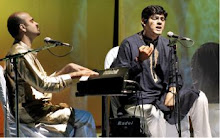
This article is a dedication to Morris Holbrook. He was a professor at Columbia Business School and taught me to appreciate music holistically. I will always hold him as a prime example of someone who learnt to juggle music with academics, and did both with so much grace. And thought nothing of the sacrifices one makes in the spheres without in order to pursue one's passion whole-heartedly.
Professor Holbrook did a series of studies on music, mostly to understand the role music plays in shaping the way most of us think and feel about things non-musical. He once told me that the found that most adults form their "preferences" for musical styles and formats in their early to mid twenties. Knowing fully well of scores of relatives who took to appreciating classical music well into their forties, I questioned that observation until he gently guided me through the reasoning of the human mind in its quest to categorize musical stimuli early. I do not remember how that particular conversation went, but we discussed one possibility. We reasoned that the groove perhaps gets set much earlier than we realize. The understanding of "concepts" and "spiritual connect" happens much later. In effect, our minds quickly become comfortable with the structural characteristics of a preferred music form much earlier than the 'emotional' meanings associated with it, which in turn are affected by life situations and experiences as the years roll on. A fascinating idea.
As I think back to the musical styles, songs, artists and records that I treasure the most, I realize that the music I heard while taking the commuter train to work in Mumbai shares pride of place with the concerts I had attended at the time, all of which happened in my early twenties! I had started listening to Carnatic music at the time, a preference that has now burgeoned into a dangerous obsession. I had also started listening to Miles Davis and for some inexplicable reason, to Cat Stevens. And I hoarded my Ilaiyaraja "mixed tapes" like a smuggler with new-found gold. Musical favourites that continue to dictate my life, evaluations of other artists and styles.
And this brings me to the next observation, which is perhaps an important one. I see the young India emerge with a swagger, confident and unfettered by constraints. They march to a rhythm that is unquestionably rooted in our cultural identity, and yet keep themselves porous enough to admit influences from other worlds. Musically, this is an exciting phase of life to be in. I am yet to see someone under the age of thirty who does not compulsively listen to music of some form. Be it classical, pop, jazz, reggae, and of course the ubiquitous "film" music, the young Indian is far more exposed to every style and format, aided by the combined might of the recording industry and the information highway .
In this milieu, it is important for musicians from all genres to realize that the new collective is forming "grooves" that they will perhaps stick to listening to even in their older years. As a musician, I can see that this is perhaps a responsibility, and also a position of tremendous privilege. It is a call to communicate to younger audiences more meaningfully, developing a dialogue that will deepen their interest in, and their craving for, music that is both contemporary and representative of a cultural identity that they are proud to espouse.
It is also a call for more "composers" and creators of original sound. As ever, I maintain that the younger India is endowed with tremendous creativity, and are capable of pushing forward the repository of musical content we currently enjoy. New sounds that reflect individual compositional style should be judiciously interwoven with themes that reflect today's mood and preferences. And this does not mean resorting to the sort of risqué lyricism that predominates popular music. Traditions can be retold with grace, stories that embody our cultural heritage can be vocalized through younger and new perspectives equally well.
When I think of Professor Holbrook sitting in his office at the business school, playing jazz on his makeshift keyboard suite, I think of the word "bliss". There is a secret to all this, he used to say - to be able to understand the vagaries of the corporate world, make sense of academic politics and maintain one's passion for a language that goes beyond the corporeal requires the perfect balance. It requires being able to understand ancient stories but tell them in a way that is entirely new, infusing old themes with entirely new music and push forward the envelope boldly. And keeping one's focus on the young people, for they will decide what will become of the world we know. It is this focus that will keep the music we make from going out of style!
ANIL SRINIVASAN
Copyright New Indian Express


1 comment:
Lovely post!! Could hear the music in the background :-)
Post a Comment